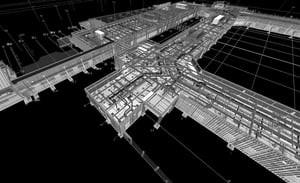
TECHNOLOGY AND INNOVATION
Embracing Technological Advancements
Curiosity fuels our drive to constantly seek out innovative solutions and stay ahead of industry trends. We are committed to staying at the forefront of our field, continually expanding our knowledge base, and challenging conventional thinking. Our team's desire to dig deeper and explore new possibilities allows us to go beyond mere problem-solving and instead proactively anticipate our clients' needs and offer creative solutions. We recognize that curiosity fosters growth, and by embracing it, we empower our clients to achieve their goals through innovative and forward-thinking approaches.
A Revolution of Efficiency
At CSM Group, we are dedicated to simplifying complex projects while prioritizing safety and maximizing efficiency. We achieve this by harnessing the power of cutting-edge technology.
The latest digital technologies are transforming routine tasks in the construction industry, driving significant efficiency, safety, and productivity advancements. This transformation is evident across various construction aspects, including design, planning, project management, and on-site operations.
Examples of advanced technology we utilize include:
Building Information Modeling allows construction professionals to create and manage digital representations of a building's physical and functional characteristics. This technology enables collaborative design, clash detection, accurate quantity takeoffs, and seamless coordination between different trades, minimizing rework, reducing material wastage and overall construction costs.
Off-Site Manufacturing is used to manufacture significant whole-building components in a factory environment. This reduces on-site field work time which improves safety, quality, and is less impacted by environmental weather conditions, improving time and cost.
Drones equipped with high-resolution cameras and sensors can easily capture aerial images and survey job sites, providing real-time data to construction teams. This information enables better site analysis, monitoring construction progress and material quantification, identifying potential issues, and improving safety by reducing the need for manual inspections.
The implementation of Internet of Things (IoT) devices on construction sites has improved safety and efficiency. IoT devices, such as sensors and wearables, can monitor conditions like temperature, humidity, and noise levels, alerting workers to potential hazards. This real-time data can also help optimize resource allocation, equipment maintenance, and overall project scheduling.
Dashboards offer stakeholders a visual snapshot of project data, including key performance indicators (KPIs) and progress updates. This centralized view helps quickly identify issues and enables informed decision-making.
Risk registers assist teams in identifying, assessing, and managing risks throughout the project lifecycle. By documenting potential risks, their likelihood, impact, and mitigation strategies, teams can proactively address challenges.
Together, dashboards and risk registers enhance project transparency and efficiency by providing a clear overview of progress and risks, ultimately leading to greater project success.
- Protecting Client Data
- Safeguarding Intellectual Property
- Ensuring Business Continuity
- Meeting Regulatory Requirements
- Reducing Third-Party Risks
- Boosting Employee Awareness
- Maintaining Trust and Reputation
A Hassle-Free Experience with Project Controls
Our project controls services enable clients to have a comprehensive understanding of their projects, enabling efficient decision-making and ensuring project success. With our expertise in project scheduling, cost management, risk mitigation, and performance tracking, we provide clients with accurate and real-time data, allowing them to make informed decisions at every stage of the project.

Finding Success in a New Technological Landscape
Automation tools and AI applications significantly benefit the construction industry by enhancing efficiency and decision-making. These technologies streamline processes, improve productivity, and ensure better project execution.
Automation eliminates manual tasks, allowing for effective time and resource management. For example, automated project management systems simplify scheduling, resource allocation, and budget tracking, helping companies meet deadlines and stay within budget.
AI applications analyze complex data sets to provide valuable insights, helping construction managers make informed decisions about resource allocation and risk management. They can adapt to changing factors like weather or supply chain disruptions, providing updated construction sequences in real time.
Additionally, these tools enable real-time monitoring of site conditions, equipment, and worker safety, helping to identify and address issues promptly. By facilitating communication through cloud-based platforms, they ensure seamless collaboration among teams and stakeholders.
